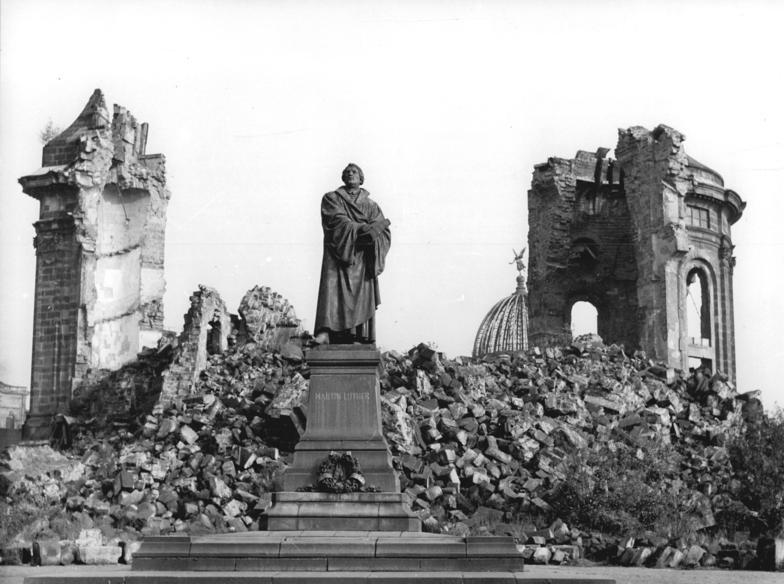 |
| Loschwitz face |
We were busy tourists in Dresden, where the sächsische Dialekt is perky and musical, with liltier vowels than Bayerisch and crunchier consonants.We heard many times that Draesden ist aene schaene Stadt (Dresden ist eine schoene Stadt/Dresden is a pretty city), and indeed it is, on a monumental scale.
Our first full day in Dresden, Janice and I walked ~10 km from our
Ferienwohnung to the Altstadt. We crossed over the Elbe from Loschwitz to Blasewitz on the
Blaue Wunder. The bridge made headlines in the 1890s for being a feat of engineering--its claim to fame was the lack of any support pylons in the river--and it survived WWII thanks to assorted civilians who prevented the retreating Wehrmacht from blowing it up.
We followed a biking path along the Elbe, past
Schloss Albrechtsberg...
...and eventually met up with the rest of our families on the
Brühlsche Terrasse for lunch. Afterward, we headed toward the
Frauenkirche for a horse-drawn tour of the old town.
The Frauenkirche didn't [re]exist the last time Stefan and I were in
Dresden (1995), because it hadn't yet been rebuilt following its
firebombing in 1945.
 |
| Frauenkirche Dresden, November 1958, Bundesarchiv, Bild 183-60015-0002 / Löwe / CC-BY-SA |
The rebuilt church (
Evangelisch, in case the statue of Martin Luther doesn't give that away) is stunning inside and out. My understanding about the rebuilt church is that the dark stones were salvaged from the destroyed church; the light stone is new.
Another of the many monumental sights in the Altstadt is the
Fürstenzug. The largest porcelain artwork in the world, it
depicts a chronology of Saxon rulers from 1127-1904.
While Janice and Martin took the kids to the Stadtmuseum, Stefan, Helen, and I oohed and ahhed our way through the Albertinum, which houses the
Galerie Neue Meister (roughly, Caspar David Friedrich to Gerhard Richter).
Afterward, we headed back to Loschwitz in search of refreshment and ended up atop the hill over town. We had cake and coffee (and Stefan scored a glass of
ganz normales Leitungswasser for me) at the cafe
Luisenhof, where iridescent green lizards added to the scenery.
The views over Dresden were so impressive, all of us went back the next night for dinner.
The food was beautiful too, including this tasty chilled cucumber-borage soup with dill, borage blossoms, and saffron cream. Mmmmm.
We stayed in Wachwitz. The back yard gate of our Ferienwohnung led right to the Elbe, offering multiple opportunities for scenic walks along the river.
Further downstream was
Schloss Pillnitz, the summer residence of Frederick Augustus I. The part of the castle shown in the photo below is on the Elbe; the steps lead right into the river. To the right of the rightmost arch, lines mark Elbe flood levels; the 2002 flood matched one in 1845, when the water rose to the top of the arches.
At Schloss Pillnitz, we learned that Saxony remains an outpost in the realm of making people pay to pee. When I first came to Germany in 1990, public toilets pretty much always required payment. Many restrooms in Germany today have an attendant, and it's considered polite to leave a small-change tip, but even if you don't have any spare change, you still get to pee. Not so in Pillnitz, where you have to pay to enter the garden grounds and then you have to pay more to pee:
"Please only put in fifty Euro cents" to access to stall. Apparently folks have been trying to overpay. I suppose if you don't have a fifty cent piece, you might discretely pee on the lawn:
I didn't think of that option until after Elias and I had already used the toilets, so instead I expressed my indignance by walking on the grass. So there.
From Pillnitz, we drove up into the
Elbsandsteingebirge (Elbe sandstone mountains) to see the
Bastei.
Bastei means "bastion"; I don't know if the name is for the rock formations or for the fortification that existed on the rocks in the Middle Ages.
On our last day in Dresden together, we took a steamboat ride from Blasewitz to Pillnitz and back. "Steamboat ride" is one of those excellent compound German words that lets you put three fs together in a row: Dampfschifffahrt.






































